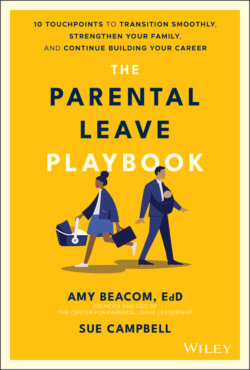Читать книгу The Parental Leave Playbook - Sue Campbell - Страница 20
Companies Are Expected to Do the Work of Society
ОглавлениеWhen I decided to dedicate my career to helping parents through this transition, I was very thoughtful about the most efficient way to do it. The truth is that this is not parents' problem to solve. It's a systemic problem. One which today's companies are in a unique position to fix—and benefit from its solution. In part because the effort for a paid leave law was already well established and given my area of expertise in organizational development and executive coaching, I decided to focus the bulk of my efforts on companies, managers, and working parents. For many of us, financial stability and even self-esteem depend on gainful employment. A good boss can make or break the parental leave experience. (If you haven't yet heard someone say you've won or lost “the boss lottery,” you will.)
I wanted to help companies understand the advantages for them in being supportive during this major life transition: an edge over their competitors when it comes to recruitment, better retention, increased growth of their female leadership pipeline, improved morale and productivity for working parents, and improved risk management, to name a few. Too many companies mistakenly categorize parental leave as a one-way “benefit,” when in reality it needs to be seen as a strategic opportunity not to be missed for the whole organization.
Increasingly, leaders within organizations are coming around to this perspective. Starting in 2015 we began to see a spate of major US companies announcing generous parental leave benefits that were in line—or even more generous than—what many European countries offer. Microsoft, one of my company's long-time clients, announced in 2015 that they would offer 12 weeks of 100% paid parental leave to all parents, in addition to the 8 weeks of maternity disability offered to birthing mothers. In making their expansion, Microsoft also realized that policy alone is not enough. Supporting practices must be put in place to require—and influence—culture change. We worked with Microsoft to develop a program that trains employees and managers around the world about how best to navigate the parental leave transition. They were the first company in the country to offer an employee-manager-aligned parental leave training and support program, a pilot so successful that it was rolled out globally.
Once I began working with companies on these issues, I realized how many challenges they face when it comes to parental leave. For example, beyond talent attraction, retention, and compliance issues, lack of a good leave policy also compounds risk management costs. If exhausted new parents come back to work too soon, they present an increased safety risk. AAA's Traffic Safety Advocacy and Research department reported that “a driver who has slept for less than five hours has a crash risk comparable to someone driving drunk.”5 Imagine how a sleep-deprived new parent plays that out in the workplace, especially if heavy equipment or important decisions are involved. Having someone come back to work too soon increases health care costs and jeopardizes health and wellness initiatives. If people don't get the time and support they need to heal and rest, their health suffers and insurance costs and absenteeism rates increase.
Ironically, the current trend of individual states passing paid leave can actually hurt companies, because those that operate in multiple states must keep track of and comply with many different (and complicated) laws. This adds a serious cost and administrative burden. I know many parents who couldn't care less about this administrative burden (like Rachael in the introduction) and are simply angry not to have paid leave through their employer, but that frustration is misplaced. This is something our federal government should be solving, not individual companies. According to the Small Business Administration's Office of Advocacy, 99.7% of companies in the United States are small businesses.6 When we think of companies, we cannot just think of the Amazons and Googles of the world, with a sense of what they “owe” us.
Small businesses are affected more than larger businesses because larger companies can afford to offer paid leave benefits that attract the best talent, and the administrative costs that come with them. Small businesses often cannot. Even though in most states our current system doesn't legally obligate them to provide paid leave, there are other detrimental financial effects—such as having to pay to replace workers who leave after becoming a parent.
Although I see many companies fighting against the idea that parents should be supported with paid leave to take time away from work to welcome children, I think this is largely due to a lack of information on this issue. It is not easy being in leadership at a company of any size, and leaders often push back on anything that could cut into the bottom line and threaten the solvency or the day-to-day functioning of the company. However, forward-thinking leaders realize that supporting new parents through generous policies and strong support practices can literally pay dividends. It costs far more to recruit and train a new employee than it does to retain an existing one (the Society of Human Resource Management reports the cost of directly replacing an employee can run as high as 50% to 60% of their annual salary; total associated costs of turnover can range from 90% to 200% of an employee's annual salary).7 Last, studies show that parents who are healthy (and well rested!) are more productive, more innovative, and even more loyal to their company.8
Clearly, the best thing for families and companies would be a generous federal benefit that provides clarity and stability for everyone involved.
